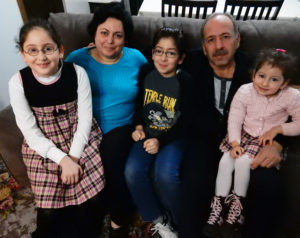Conflict, cancer and cruelty – a refugee family’s journey
Escaping a desperate gun battle, beating breast cancer in a war zone and living for months in a cramped single room in the middle of a foreign city are all parts of the amazing story of one refugee family who have escaped one of the most brutal conflicts in modern history to find safety in Melbourne.
The Gharibeh family had decent lives in the Syrian capital of Damascus – running a business, attending school and entertaining friends – until war came.
When the shells started pounding the contested districts of their hometown, their lives – like the bricks and masonry of the city said to be the oldest in the world – started to disintegrate.
Antoun Gharibeh, his wife and three children saw everything they had worked towards shattered in just a few short months.

The Gharibeh family
“It was about five years ago when the war started in Syria that we first began to feel fearful. The shelling started and there was fighting and we felt under threat,” Antoun said, speaking though his interpreter and Melbourne-based brother-in-law Ramez Aldaoud.
“The school my kids went to was bombed so we stopped sending them. Business became difficult so we started to lose our income and there was the physical threat as the fighting started to increase and spread.”
Antoun and his family lived in a largely Christian suburb of Damascus but his carpentry and joinery business was in another district where there was more intense fighting.
As the war escalated it became more difficult to operate the business but Antoun would occasionally go to check on the premises.
On one of these trips he was captured by an anti-government militia group.
“I was being held by these gunmen and I was very scared,” Antoun said.
But just as he began to fear the worst, a government patrol appeared and a fire fight broke out allowing Antoun to take cover in a ditch and slowly crawl away from the gun battle.
“I was terrified. It was chaos and I was trying to keep down to avoid being hit but also trying to crawl away,”Antoun said.
Antoun says he crawled six blocks to escape the battle and finally made his way to a government checkpoint from where he was able to get aboard an army convoy vehicle and make his way home.
“I approached the checkpoint with my hands raised saying ‘I am fleeing the militia’. But I did not know at first whether they would believe me or how I would be treated. I told them my story and luckily they believed me,” he said.
Antoun’s brother-in-law Ramez explained that people in the west are told that the government of Bashir al-Assad are the bad guys and the militias are fighting for freedom.
“But if you are a Christian in Syria, things are a lot more complicated than that,” Ramez said.
“Many of the Islamic groups are suspicious of Christians so it can be very dangerous.”
When Antoun arrived home the evening of his brush with militias, he told his wife, Amal, of his lucky escape and they decided together it was time to leave the country of their birth.
“We decided we must go ‘yesterday and before tomorrow’,” Antoun said, using an old Syrian phrase to emphasise the family’s desperation.
The family hired a taxi and headed for the Lebanonese border with their hearts in their mouths.
“It was a risky trip but luckily there were no militia checkpoints on the route our driver took,” Antoun said.
Arriving in Beirut with little more than the clothes they wore and very little money, they stayed with Antoun’s brother in a single room for two months until they were able to rent a small apartment outside Beirut.
With little money and no assets, they were forced to appeal to family members in Australia for help.
“It was very hard for us and we received very little help from the UNHCR. Without the help from our family in Australia, I don’t know what we would have done,” Antoun said.
The Gharibeh family’s relatives in Australia had already applied to have them come here as refugees when Amal fell ill with breast cancer.
This put the whole process back 12 months because of the Australian Government’s health requirements for refuges and migrants.
And because of the cost of health care in Beirut, Noor was forced to travel back to Syria for treatment.
“It was very stressful,” Amal’s sister and Ramez’ wife Nour Haddad said.
“They could not afford for Amal to have treatment in Lebanon because it would have cost $US100,000 – so she had to go back to Damascus for an operation and for chemotherapy,” Noor said.
“It was very dangerous and it meant that it took much longer to get them to Australia.”
Antoun, Amal and their children George, 11, Jolyana, 10, and Jouly, 3, arrived in Melbourne last month after three years in limbo in Lebanon. Amal is fully recovered from her cancer and the family is now living with Ramez and Nour at their home in Melbourne’s northern suburbs.
Antoun and Amal are relieved to be safe after their five-year ordeal and are optimistic about the future for themselves and their children who started school in the local area this week.
“In Damascus the children were very scared and could not sleep. They could not go to school because of the shelling,” Antoun said.
“Also we were scared for them all of the time. Until now they have not been to school for four years.
“I feel safe here and I’m very thankful to Australia to be here and for the assistance my family has received.
“Just seeing the happiness on my children’s faces tells me they now have a chance at a brilliant future – something they would not have had if we had stayed in the Middle East,” he said.
Laurie Nowell,
AMES Australia Senior Journalist












